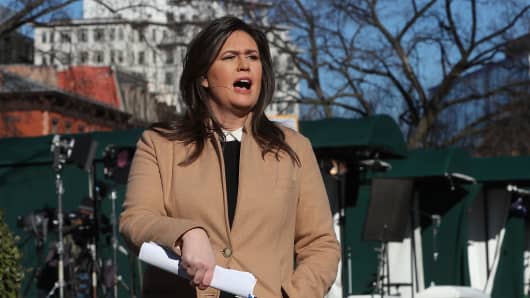- The White House could back down from its demand for $5 billion in border wall funding in a year-end spending bill, press secretary Sarah Huckabee Sanders says.
- Parts of the government will shut down on Saturday if lawmakers don't pass spending bills.
- Trump has threatened to let funding lapse if he cannot secure money for the border wall.
The White House suggested Tuesday that President Donald Trumpcould back down from his demand for $5 billion to fund his proposed border wall in a year-end spending bill.
Trump's push for the money has threatened a partial government shutdown when funding for seven agencies lapses after midnight Friday. Last week, the president said he would be "proud" to close parts of the government over border security.
"We have other ways that we can get to that $5 billion that we'll work with Congress," White House press secretary Sarah Huckabee Sanders told Fox News on Tuesday morning. She added that the Trump administration could support $1.6 billion in border security funding proposed by Senate Democrats, as long as it can "couple that with other funding resources" to get to $5 billion.
She added that "at the end of the day, we don't want to shut down the government. We want to shut down the border." Senate Minority Leader Chuck Schumer and House Minority Leader Nancy Pelosi have cast the potential lapse in funding as the "Trump shutdown." When Pelosi goaded Trump into an Oval Office fracas last week, the characterization appeared to irritate the president.
Sanders' comments mark a de-escalation in the White House's rhetoric on the proposed barrier on the U.S.-Mexico border. Trump has repeatedly threatened to force a shutdown if he cannot secure money for the wall. As a candidate, he promised to force Mexico to fund the barrier.
Still, Trump himself has not weighed in Tuesday on how much money he would accept. As always, a comment or tweet from the president could trample on the message administration officials try to send.
Later Tuesday, Sanders put the burden on Congress to find a solution, even though GOP lawmakers have said they do not know what Trump would accept. The White House wants to "see what the Senate can pass" and then the administration will "make a determination" on whether to sign it, she said. She added that Trump has directed agencies to see if they have money to put toward border security, though Schumer flatly said Tuesday afternoon that such an effort would not get congressional approval.
White House Press Secretary Sarah Huckabee Sanders speaks to the media in the White House driveway after appearing on a morning television show on December 18, 2018 in Washington, DC.
Schumer met with Senate Majority Leader Mitch McConnell on Tuesday. The Kentucky Republican proposed an appropriations bill that includes money for border security fencing, as well as what a Senate Democratic aide described as a $1 billion "slush fund" that Trump could use on his immigration policies. Democrats rejected the deal.
A McConnell spokesman later told NBC News that the "hypothetical slush fund" would not go toward a wall. Speaking to reporters Tuesday afternoon, McConnell said he offered a plan to Schumer that he "thought was reasonable to both sides." He later heard back from the Democratic leader "that the offer was not acceptable," he said.
On Tuesday afternoon, Schumer told reporters that he thought the "Republican offer today would not pass either chamber." However, he said Democrats would "very seriously consider" a short-term measure to keep the government open if McConnell offered it.
Despite the lack of a deal, the Senate GOP leader said he is confident the government will not shut down. McConnell said is consulting the White House on how to move forward, and he hopes to hear more later Tuesday about what the president would support. He called the Trump administration "extremely flexible" on the issue.
In proposing $1.6 billion in border security funding, Schumer has said it would go to building new or repairing existing fences, rather than the wall as Trump has proposed it. The White House appears to want to claim that funding as "wall" money to promote a victory.
Trump has also claimed his administration has built large portions of the wall. But Congress has only authorized money to build fencing similar to existing structures. The president has also contended that the military could build the wall — though the Pentagon has said it has no plans to do so, yet.
On Tuesday, Pelosi told reporters that "we'll see" if negotiations with the White House make any progress. She said the wall "is not about money," but rather "about morality."
"It's the wrong thing to do. It doesn't work. It's not effective. It's the wrong thing to do and it's a waste of money," the California Democrat said, according to NBC News.
The president has already signed spending bills for five government agencies, including the massive Departments of Defense and Health and Human Services, into law. Lawmakers still have not passed spending bills for five agencies. Trump's push for wall money as part of Department of Homeland Security funding has snagged talks to dodge a shutdown.
Schumer said Tuesday morning that he and Pelosi had not heard from the White House on two offers it made to avoid a shutdown. One includes appropriations bills for six agencies and a year-long continuing resolution to fund DHS. The other would pass a continuing resolution to keep all seven departments running.
Schumer again urged Republicans to support one of those plans on Tuesday afternoon.
Leaving McConnell's office Tuesday, the New York Democrat said he had not heard a "peep" from the White House, according to NBC News.
As only about a quarter of the government would shut down this weekend, it would have only limited effects. Along with Homeland Security, the unfunded agencies are the departments of Transportation, Commerce, Interior, Agriculture, Housing and Urban Development and Justice.
While some functions like national parks would close down, some employees and law enforcement officers at those agencies would continue working without getting paid temporarily. Those would include employees such as FBI, border patrol and Transportation Security Administration agents.

